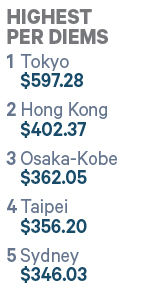
Tokyo's per-diem business travel costs, at $597 based on fourth-quarter-2018 corporate travel data, not only were the highest among all Asia/Pacific cities in BTN's Corporate Travel Index but also were second-highest worldwide, behind New York. While Tokyo's average daily hotel costs, at $250, are on the high side, plenty of other global cities hit that mark in lodging. It's the $203 airport-to-city center taxi cost that really pushes pricing here.
American Express Global Business Travel EMEA and Asia/Pacific director Philip Haxne said this fall's Rugby World Cup is bringing more hotel rooms, but demand and prices are rising equally. Whether demand for inventory will drop after the World Cup and how that will affect pricing are points to watch. However, travel buyers have to consider transportation costs in Japan's capital city. "Tokyo is always tough, not just because of hotel price but because you also are stuck with what is directly around your business location because traffic and ground transportation is difficult," said Haxne.
Congestion is an issue in many Asian cities, and buyers may determine that location, rather than price, should drive hotel partner choices. BCD Travel's Industry Forecast 2019 cited traffic concerns in markets from Beijing to Jakarta to Bangalore, as well. Beijing Daxing International Airport will open this year, relocating major carriers farther from the city center. The good news is that high-speed rail will rescue traffic-weary business travelers.
China Is Still Booming
Despite slowing economic growth in China, GBT continues to watch the country. "Room nights are expanding at a scale that we've never seen before," said Haxne. "Something like 580,000 rooms will be built [in China] in the coming years." Will demand keep up with the supply? So far, hotel pricing in Chinese cities has not commanded the high rates associated with tight markets. Shanghai's average hotel price booked by corporates in the fourth quarter of 2018 was just under $150, while daily food costs, at $160, pushed per diems up.
Business travel costs in other Chinese cities, including Beijing, landed in approximately the bottom third of the index of non-U.S. cities. Add to that picture the tension in U.S.-China trade relations, and inbound business travel demand could dim. Haxne brushed those concerns aside, pointing to China's growing domestic business and leisure travel demand not only to major cities but also to secondary markets. "If the supply increased too much and demand doesn't come in, it could be interesting, but domestic travel is increasing so much it could take care of the demand side," he said.
Hot Markets
BCD is watching a handful of Chinese cities for hotel rate hikes. In Hong Kong, rates could rise as much as 5 percent this year due to tight market conditions and some hotel closings. Shenzhen could be siphoning business travel out of Hong Kong, as businesses relocate to the mainland city, according to BCD. Chengdu is in a similar situation, as more businesses view it as an up-and-coming technology hub.
Expect hotel rate hikes as high as 10 percent in several Indian cities: Bangalore, Mumbai and New Delhi. However, hotel rates in these cities are among the lowest on BTN's index, and such increases still would place them firmly in the bottom third of global cities based on per-diem costs.
Risk
As more travel managers take on traveler safety and security issues, understanding risk patterns in their business travel markets has become a priority. The Indian cities listed among the fastest growing for business travel—Bangalore, Mumbai and New Delhi—also were among the riskiest in BTN's index, according to GeoSure. Mumbai was the third-riskiest city, behind Guatemala City and Cairo, thanks to intense political unrest and to personal harm to or discrimination against LGBTQ individuals or groups. On the other hand, Singapore was among the safest cities on the entire index. Melbourne, Sydney and Tokyo also ranked low for risk to travelers' health and safety.
For more details on Asia/Pacific risk ratings and more granular per-diem data, check out BTN's Corporate Travel Index Calculator.